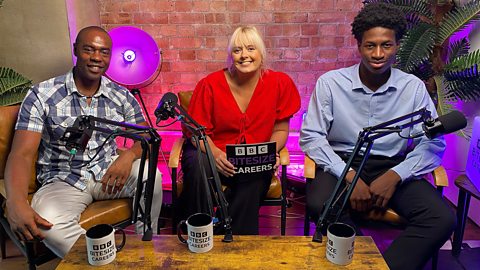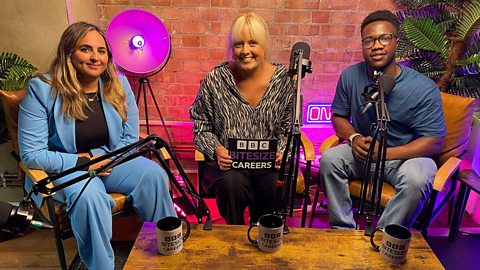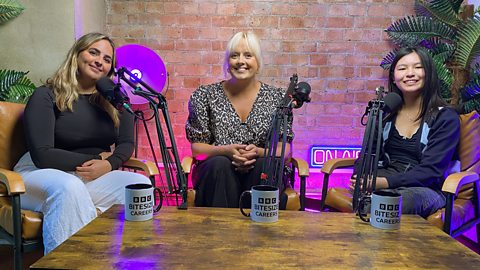The Bitesize Careers Podcast: What should I do in a job interview?
Join us for interview advice on everything from prepping like a pro to dealing with potential rejection.
Series two of The Bitesize Careers Podcast is tackling the most popular questions you've asked about the world of work. In this episode, Radio 1's Katie Thistleton chats to award-winning careers coach Mark Anderson and student Seren about the dos and don’ts of interviews. Today's big question is:
What should I do in a job interview?
Katie Thistleton
Hello and welcome to The BBC Bitesize Careers Podcast. This is the podcast where we help you try and figure out what you want to do with your future. This podcast is for you, the young people who are just starting out on your career journey. We're going to try and answer some big questions - questions that have been sent in by you, and questions that, maybe, you don't even realise you've got yet. And the question that we're going to try and answer from the Career Question Wall today is: what is essential to do in a job interview to make myself presentable? So joining me today to offer their expertise and help me try and answer that question are our brilliant career expert, Mark Anderson, who's here to give all his top tips; and also Seren, who, like many of you, is starting to think about her next steps. Hello, both of you.
Mark Anderson
Hello, Katie.
Seren
Hello.
Katie Thistleton
Now, Seren, you're still at school, so you're going to be offering your advice today, but also, you're learning as well.
Seren
Yes, definitely. Really keen. I need to know these tips.
Katie Thistleton
Amazing. Okay, so before we dive into how to present ourselves in interviews, let's do a little warm-up game first to get us all limbered up. Does that sound good?
Mark Anderson
Okay, yeah.
Katie Thistleton
The game is called Do or Don't Do. I'm going to read out some actions or behaviours that people might exhibit in interviews, and I want you to tell me whether it's a “do” or a “don't do” - something you should do or shouldn't do in an interview. Does that make sense?
Seren
Yes.
Katie Thistleton
Are we ready?
Mark Anderson
I think so.
Katie Thistleton
Okay, the first action is arriving early for an interview. Seren, do you think that's a “do” or “don't do”?
Seren
I'd say, “do”. It shows you're punctual. Maybe they can trust you in the future.
Katie Thistleton
What do you reckon, Mark?
Mark Anderson
Yeah, definitely. Definitely a “do”, yeah. And it can also help you to just compose yourself and get yourself ready before the interview. So it's good to arrive early.
Katie Thistleton
Okay. Next action: slouching in your chair during the interview. A “do” or a “don't do”.
Seren
I'd say “don't do”. It kind of shows that you're not bothered. And the - I don't know, a bit lazy maybe. I wouldn't.
Katie Thistleton
I'm looking at your posture now, Seren. I'm looking at Mark's as well. I feel like maybe I'm slouching a little bit. Would you agree, Mark?
Mark Anderson
Yeah, definitely. Body language is so important when it comes to an interview. It creates a really good first impression if your body language is good. So things like eye contact, sitting up straight, not crossing your arms, all things like that are really important.
Katie Thistleton
And it's hard because when you're nervous that - your body language - can be the first thing that shows it. You know, you're like, what do I do with my hands? And so you've just got to try your best. Okay. Next action: looking at your phone during the interview. Do or don't do?
Seren
Don't do. It kind of shows you’re easily distracted and you're not really focused on the interview, so I wouldn't.
Mark Anderson
Yeah. I think you're right there. Yeah, you’ve just got to be focused. Keep your eye contact, stay engaged. Don't go on your phone.
Katie Thistleton
No. Definitely not. Next action: taking a notebook into the interview. Do or don't do?
Seren
I'm not sure. I wouldn't - I'm not sure if I’d take something in, but - because I don't want to get distracted by the notebook, but then I can't see it being a bad thing. I'm not too sure.
Mark Anderson
Yeah, I think you're right. It's not something that people think about doing, necessarily, but it can be a good thing to do. They might say something that you want to make a note of, so it can be useful to take notes. So yeah, I don't see any problem with that.
Katie Thistleton
I've taken a notebook into an interview, I think, to write down any answers to questions I had for them. And also, a lot of people don't know this, but you could take in like a piece of paper with some pointers in, couldn’t you?
Mark Anderson
Yeah, definitely.
Katie Thistleton
In the interview.
Mark Anderson
Yeah, yeah. Because it can be easy to forget what you want to say during the interview as well, so if you have got those pointers, that can really make a difference if you forget.
Katie Thistleton
Okay, the last action is: interrupting the interviewer, if you don't understand the question. Do or Don't do?
Seren
Don't do. I will just wait, and if you needed help at the end, you can just ask. But just wait, I'd say.
Mark Anderson
Yeah, yeah, that's a good thing to do. Just wait until they finish their sentence at least, and then, you know, if you’re still confused, then you can ask them to re-word it or repeat it.
Katie Thistleton
Okay, great. I think we’ve got a good idea there about what’s a “Do” or “Not Do” in an interview. Do you feel warmed up?
Seren
Yes, definitely.
Katie Thistleton
Right, Seren, I'm going to pass this over to you now because we would love it if you could read some questions from the Career Question Wall, please. What are people saying?
Seren
Okay, so the first question from the Careers Question Wall would be: what's the first thing you should do when preparing for an interview? Where do you even start?
Katie Thistleton
Okay, so you said, “be prepared”, but how do we prepare? Where do you start?
Mark Anderson
Yeah, I think so. Like I said, you know: researching the company, finding out as much as you can about the company, thinking about the questions that you're likely to be asked, but also think about questions that you would like to ask the company as well when you're being in that interview. So if you do all of those things, then you're well on your way to being ready for your interview.
Katie Thistleton
Speaking about those questions, Seren, you are actually an actress, aren't you?
Seren
Yes.
Katie Thistleton
So have you done interviews before?
Seren
Mainly auditions. I wouldn't really say interviews.
Katie Thistleton
You're yet to, sort of, do interviews, but you've done auditions before, which I guess kind of similar. I mean, sounds even scarier to me! But you must get asked questions like, tell me about yourself. Do you know how to answer that kind of question?
Seren
Well, the more you practise, the more you get used to it. But sometimes it's quite difficult because when they ask you to tell about yourself, I've got so much to say and not that long to say it, so sometimes it's hard to, like, condense it down.
Katie Thistleton
What would you say to that Mark?
Mark Anderson
It is tricky because, you know, where do you start with something like that? But I think if, before the interview, you can think about some key points that you would want to get across during your, what we call your “elevator pitch”. So think about what you can say in 30 to 40 seconds that really summarises your main achievements, your education background, and the things that you do in your spare time, which really summarises the type of person that you are. If you can get all of those things into a - into a few seconds, then that's a good starting point. And then if they want to ask you further follow-up questions after that, they can do that.
Katie Thistleton
It's completely understandable if you're going for your first interviews, that you might not really have a lot of experience or maybe a lot to say, Mark. So what do you put in there?
Mark Anderson
Think about your transferable skills - so skills that the employer might be looking for that you may not be able to demonstrate through previous work experience, but there might have been other things that you've done in your past that demonstrates that you've got those skills and qualities. So extracurricular activities that you may have done in school or out of school. So if you can reflect on those, and basically allow the employer to think about, okay, they've got these skills, we could use these skills in this particular role. So think about transferable skills and what else you've done to demonstrate that you've got those qualities.
Katie Thistleton
Yeah, it could even be, you know, that within your family or within your friendship group, you're the caring person or, you know, you help people out with stuff, or you work in a team, couldn't it?
Mark Anderson
Yeah, exactly.
Katie Thistleton
I think often we think, oh no, I haven't done anything, I haven't got anything to say. But everyone has, we've all got a personality, we've all got likes and dislikes and interests.
Mark Anderson
Yeah, exactly. And it's great if you have the experience, but employers are looking for potential, so if they can see something in you, then that's something they can use. So you need to just portray all of those skills and qualities that you've got.
Katie Thistleton
Have we got another question?
Seren
Yes we have. What are some common mistakes to avoid in an interview?
Mark Anderson
Common mistakes. Um. Yeah, not saying, “um” too much! That's one.
Katie Thistleton
Sometimes you can't help it. Yeah.
Mark Anderson
Very true. Um, and I think just not asking questions. Um, I think that's really important. If they say to you, if you've got any questions for us, and you say, no, that's not a good impression. So I think, you know, as long as you've got some questions that you can ask them, that's really important.
Seren
Right. Which brings me to our next question: what question should you ask in an interview?
Mark Anderson
Okay. Well, if you imagine if you get the job, and they say yes to you, and at that stage you're likely to be thinking, oh my goodness, can I do the job? And then you've got lots of questions in your mind. So think about the kind of questions that you would want to ask if they were to offer you the job. Chances are one of the questions is likely to be around something like training. So you're not going to be just left in the lurch when you go into the job. So you can ask questions about, you know, how they're going to train you up to do the job well. And you might want to ask some general questions about, you know, how many days holiday you're going to have, and things like that.
Katie Thistleton
If you were to ask, like, about how many days off you get, would that give the impression that you just want…
Mark Anderson
Yeah, I suppose there is that. But I think it's about how you word the question. Yeah, uh, you know, trying to word it in a way that makes you sound you're keen to start the job. Just try and think about questions that you that might concern you if you weren't to ask those questions, and just make a note of them before the interview.
Katie Thistleton
Great. Any more questions, Seren?
Seren
Yes. How do you handle it when you don't get the job? And is it rude to ask for feedback?
Mark Anderson
Yeah, I think certainly, if you don't get the job, it's really important to remember that it's not about you and to try not to take it personally. It's always difficult to do that, but it might be the case that you're just not the right fit for that particular role, but you will be the right fit for a role. So it's important to remember that, and just remember that, you know, the fact that you got the interview shows that on paper you could do the job. It's just that somebody else might have been a better fit. So it's just really important to remember your qualities, remember what got you the interview in the first place and hold on to that. Um, in terms of asking for feedback, yeah, it's a good thing to do and it's a good habit to get into, after your interview, just to find out where you may have gone wrong or how you could have answered questions in a different way. So it's a good thing to do.
Katie Thistleton
Great. Do you handle that rejection okay when you do your auditions? I mean, I'm sure you get most of them, Seren, but it's a fickle business, acting, isn't it? How do you handle it if you don't get a job?
Seren
I always just focus on the bigger picture, and there's always more to come. And I'm still young, so there's many more opportunities, I think.
Katie Thistleton
That's good. I think focusing on the bigger picture is good. It doesn't mean your career's over. It's just one job. One interview. Great. Um, well, those are really great questions, so thank you very much to everyone who sent those in. Let's try and summarise all that now, shall we, Mark? What would you say are your top three tips for presenting yourself well in an interview?
Mark Anderson
Okay, so first of all: good body language. That's really important. Thinking of questions that you would like to ask. And also preparation, practising answering those questions before your interview.
Katie Thistleton
Practice is good, isn't it? Practising in front of the mirror, I think is always a really good one with an interview. Seren, how are you feeling about any future interviews? You've not really done interviews before. You've done auditions.
Seren
Not really. I feel much more prepared, and I'm definitely going to think more about the elevator pitch and try and condensing it down to about 30 seconds.
Katie Thistleton
Great. Well, maybe that should be our takeaway task, then, do you reckon Mark? We like to give the listeners a takeaway task that they can go and do now, to make that next step towards a future career.
Mark Anderson
Yeah, yeah. Sit down and write something that would take about 30 to 40 seconds to read out and just practise saying it out loud, and just make sure it sounds natural to you.
Katie Thistleton
Great. Well, that was brilliant. Thank you so much, everyone. Thank you for watching and listening. Don't forget there are more episodes on the BBC Bitesize Careers website for you to watch. Or you can listen on BBC Sounds. Thank you so much, Mark, and thank you Seren for joining me today.
Seren
Thank you!
Mark Anderson
Thank you!
Katie Thistleton
Well that is a wrap. But remember, interviews don't have to be scary. They're not as scary as they sound. And interviews are just as much about you getting to know the interviewer as they are about the interviewer getting to know you. So good luck. Keep practising and we'll see you next time. Bye!
Seren
Bye!
Mark Anderson
Bye!
Podcast key moments
- Introduction from Katie: 00:00
- Do or Don't do warm-up game: 01:06
- Should you arrive early for an interview?: 01:27
- Should you be slouching in your chair during the interview?: 01:45
- Should you be looking at your phone during the interview?: 02:21
- Should you be taking a notebook into the interview?: 02:39
- Should you be interrupting the interviewer, if you don't understand the question?: 03:22
- Your questions answered:
- What is the first thing you should do when preparing for an interview? Where do you even start? - Mark’s advice: 03:55
- How do talk about yourself?: 04:40
- What are some common mistakes to avoid in a job interview?: 06:45
- What questions should you ask in a job interview?: 07:11
- How do you handle it if you don't get the job? Can you ask for feedback?: 08:12
- How do you handle it if you don't get the job? - Seren's answer: 09:12
- Mark's top three tips for presenting yourself well in an interview: 09:30
- Takeaway task: 10:14
- Final words from Katie: 10:28
Top tips for job interviews
- Arrive early for your interview. It shows punctuality and gives you a chance to settle your nerves.
- Don't take your phone out during an interview. If you want to take notes, just bring a notebook instead. You can even make some notes for yourself ahead of time of things you want to say and questions you want to ask.
- Be prepared. Find out as much as you can about the company before your interview. Think about the questions you're likely to be asked and any questions you want to know the answer to.
- Prepare a short elevator pitch. This is a brief summary of who you are, what you've done and what you're looking for. Focus on your strengths and think about your transferable skills but be honest about where you want to grow.
- Follow up and send a short thank you email after the interview.
Reasonable adjustments for disabilities
What are reasonable adjustments?
- If you have a disability, you have the right to ask for reasonable adjustments during the job hiring process and when you get a job
- Reasonable adjustments are changes that are made, where possible, to ensure you wouldn't be put at a disadvantage due to your disability
- What counts as a reasonable adjustment will differ depending on the role you're interviewing for and what's needed to assess your skills
- Some examples of reasonable adjustments include: a British Sign Language interpreter, asking to see interview questions in advance or having extra time to complete interview tasks/assessments.
Where can I find out more about reasonable adjustments?
- Disability charity Scope: guide to asking for adjustments at interview (England and Wales).
- Employment advice organisation acas: information about reasonable adjustments at work (England, Wales and Scotland).
- Disability Action: guide to reasonable adjustments in the workplace (Northern Ireland).
Takeaway task
Write your elevator pitch.
Sit down and write something that would take 30-40 seconds to read out that highlights your skills. Focus on who you are, what you've done and what you'd like to do.
Practise reading it out. Get comfortable with it. Think about the questions you might be asked in response. Getting prepared can help you feel more confident about the 'tell me about yourself' question from interviewers!
Pitching yourself is just like pitching an idea. Check out this article for some top tips from entrepreneur Jenny Campbell.
The Bitesize Careers Podcast on BBC Sounds
The Bitesize Careers Podcast. podcastThe Bitesize Careers Podcast
Listen to The Bitesize Careers Podcast on BBC Sounds.

Discover more from Bitesize Careers
The Bitesize Careers Podcast: Help! How can I set achievable goals? videoThe Bitesize Careers Podcast: Help! How can I set achievable goals?
Setting and sticking to goals can be hard. Katie Thistleton and guests explore top tips and tricks to help you.

The Bitesize Careers Podcast: Help! What do I do next? videoThe Bitesize Careers Podcast: Help! What do I do next?
Wondering what to do after school? Katie Thistleton and guests help you figure out your next move.

Careers: Help! How do I write a CV and cover letter? videoCareers: Help! How do I write a CV and cover letter?
Join Katie Thistleton and guests for advice on writing stand-out CVs and cover letters.

Career toolkit: How do I write a great CV?
Everything you need to know to write an engaging CV and land your dream job.

Career toolkit: How do I write a great cover letter?
Everything you need to know to write a memorable cover letter that sells your skills.

How to make a great first impression at work. videoHow to make a great first impression at work
Positive body language can make a big difference at work.
